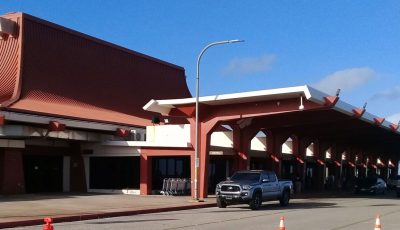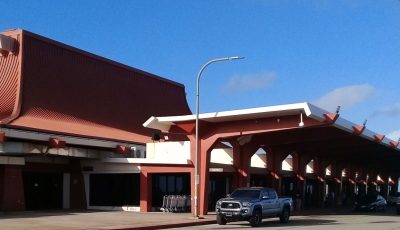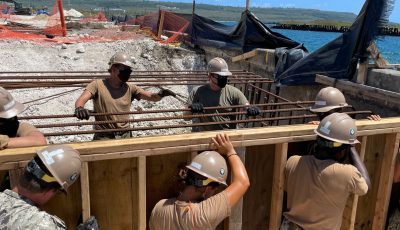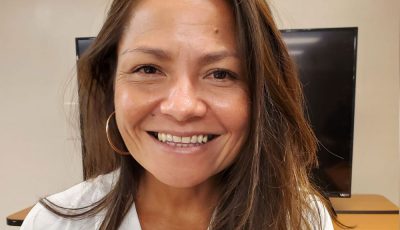Peter: No evidence that CPA at risk with its federal grantors
Public Auditor Kina B. Peter said Monday that they have not received any evidence that the Commonwealth Ports Authority is at financial or operational risk with its federal grantors as it relates to Office of the Public Auditor’s 1% fee.
Peter stated this at the House of Representatives Ways and Means Committee meeting regarding House Bill 22-102, where OPA strongly opposed the legislation for the various reasons that she said she had already presented in her prior House communication letter.
Authored by House Speaker Edmund S. Villagomez (Ind-Saipan) and supported by several other representatives, H.B. 22-102 would exempt public corporations and autonomous agencies from paying the 1% OPA fee. Villagomez stated in the legislation that the exemption provides financial relief to the autonomous agencies and public corporations that do not utilize the audit services of the OPA in the first place.
Villagomez said an additional concern for CPA is that the OPA fee, as a general charge imposed upon CPA annually, constitutes revenue diversion from CPA that would violate federal entitlement or discretionary grant conditions or jeopardize such grants for airport and seaport improvements.
At Monday’s Ways and Means Committee meeting, Peter requested that this bill be retracted and allow OPA, the Finance secretary, and all the other various agencies to resolve paid fees without acting on any legislation that would hamper OPA’s ability to operate with great independence and performance duties with the appropriate funding source.
“In conclusion, I cannot emphasize enough how detrimental the consequences of House Bill 22-102 will be. Please take the appropriate course of action that benefits the greater CNMI government and agencies rather than solving for selective cause or entity,” she said.
The public auditor said all entity and agency leaders are accountable to comply with CNMI laws.
Peter reiterated that the CNMI government has been receiving an unprecedented amount of federal money and the demands for OPA services have never been higher.
“Allow OPA as a regulatory agency of the CNMI to function and exist without the continued threat of its funding and independence,” she said.
In response to Rep. Christina Sablan’s (D-Saipan) question, Peter acknowledged reviewing the May 16, 2022, letter to CPA by Gordon Wong, who is the Federal Aviation Administration airport district office manager overseeing the CNMI.
Peter said there’s nothing in writing that has indicated that there’s been such non-compliance on the part of CPA. She said Wong’s letter, as it reads, indicates the 1% OPA fee may be considered revenue diversion and that airport revenue must be used for operations, maintenance and capital improvements of CPA’s airports. Wong stated that revenue diversion could lead to CPA being deemed non-compliant and lead to sanctions prescribed by the Code of Federal Regulations, which relates to audit requirements.
Peter pointed out that there’s nothing in writing nor has OPA been called upon or requested to provide feedback on its views of OPA’s 1% fee.
“So again this letter is not, I don’t see it as a firm communication of such non-compliance,” she said.
Peter, however, stated that she looks forward to a meeting with FAA to help clarify the intended communication of Wong’s letter.
Senate President Jude U. Hofschneider (R-Tinian) and Speaker Villagomez arranged a meeting for yesterday, Tuesday, with CPA and FAA representatives to discuss FAA’s issue with OPA’s 1% fee with respect to CPA’s airports.
Sablan said she would agree with Peter’s reading of Wong’s letter that it didn’t seem immediately clear or definitive to her (Sablan) either. Sablan, however, said she is interested in hearing from both CPA and FAA as well.
Peter said OPA, the Finance secretary, the CPA board chair, CPA executive director, and CPA controller all met Thursday to further discuss the underlying issues driving the proposed legislation.
She said CPA has claims that the driving force for the legislation is due to FAA’s concerns regarding OPA’s 1% fee, and potential non-compliance with federal requirements, specifically with regards to the airport revenue diversion. The public auditor said it was ultimately agreed that a meeting with the FAA is warranted as it would allow OPA, the Finance secretary, CPA, and FAA to resolve concerns raised by each party.
OPA is of the position that the 1% OPA fee is an allowable costs and should not result in non-compliance with FAA’s regulation. Peter said FAA’s Federal Register section B permitted uses of airport revenue and subsection B3 allows for the allocation of indirect costs.
She said under FAA policy, a portion of the general cost of government such as cost of the legislative branch and executive offices may be allocated to the airport as an indirect cost and under a cost allocation plan as long as it is not paying a disproportionate share of costs.
Peter said their view is that the OPA’s 1% fee, which amounts to approximately $150,000 to $200,000 per year, which includes the seaport revenue is not disproportionate to CPA’s costs.
Further, she said, in the most recent CPA audit report on internal control and compliance, it was noted that there have not been any federal findings associated with OPA’s 1% fees.
“In fact, it has never been noted on any prior audits,” Peter said.
At the same meeting Monday, CPA chair Kimberlyn King-Hinds said Peter is correct in saying that the issue of revenue diversion has not been cited as a finding in CPA’s audits.
“It has not been and the reason for that is because we have not been paying that. So if you’re not paying it, it’s not a finding. So it doesn’t violate,” King-Hinds said.



























